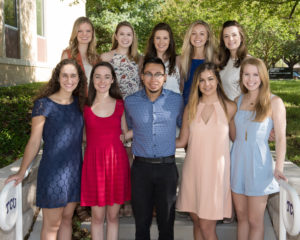Students from the Coordinated Program in Dietetics have partnered with Sodexo and the Food Recovery Network to reduce food waste on TCU’s campus.
The Food Recovery Network is the largest student movement against food waste and hunger in the United States, and it receives funding from the Sodexo Foundation, the charitable arm of the food services company. TCU students will collect prepared but unserved food from dining facilities across campus and deliver it to local shelters, rescue missions and other nonprofit organizations approved by the University.
“The idea for this partnership came from students in our coordinated program in response to an assignment to address food waste on campus. Two of these students, Annie Kate Genasci and Chandler Dalton, demonstrated during the fall 2016 semester that 88 quarts of edible food had been wasted by students in one TCU dining facility in just three and a half hours,” said Dr. Gina Hill, associate professor and director of the Coordinated Program in Dietetics. “That realization, combined with national data that indicate the average college student generates 142 pounds of food waste each year, spurred our students to find a way to reduce waste within the Horned Frog community.
“Educating the campus community about food waste and establishing a food recovery program to help end hunger in Tarrant County became the official project for our 10 seniors this semester.”
The term “food waste” is used to describe food fit for human consumption but not eaten. A significant portion of food waste is the food left on plates after a meal or food discarded from buffets, but waste occurs in all stages of food production, processing, retailing and consumption.
During their research study, Genasci and Dalton conducted a pre-campaign food waste survey among undergraduate students to determine their knowledge, beliefs, attitudes and intentions related to food waste. Sodexo then measured the food waste volume for five breakfast services in the BLUU to provide a baseline for the group’s research. Information about food waste was posted on yard signs across campus, in Market Square and distributed to students as they entered the dining facility. A post-campaign survey was conducted to determine changes, and food waste measurements were repeated in the BLUU for five additional breakfast services.

Coordinated Program in Dietetics students (Back row L to R) Maeson Wampler, Maddie Settle, Lindsey Pyke, Annie Kate Genasci, Danielle Rivera (Front row L to R) Anna Schwartz, Molly Knudsen, Miguel Lopez, Ashley Peek, Chandler Dalton
Despite favorable results from the pre-survey in which students reported positive intentions to avoid food waste, food waste did not significantly change. The campaign revealed that beliefs, rather than knowledge, were the most impactful contributor to intentions related to food waste.
“The students’ initial test was small and communication minimal, but it was a great start with information they can build on,” said Hill. “Future efforts to reduce food waste will address influencing beliefs rather than societal norms or statistics. I am confident our students will make a difference going forward and change food waste to food recovery.”
“Food consumption can vary from meal to meal and is influenced by the weather, students’ exam schedules and day of the week,” said Scott Majestic, director of operations for Sodexo at TCU. “Reducing food waste is a priority for Sodexo both financially and environmentally, and we are thrilled to be a part of TCU’s initiative to become an FRN chapter.”
The Coordinated Program in Dietetics combines course work with more than 1,200 hours of supervised practice to prepare students to be scientifically competent, accountable and ethically responsible.
The Food Recovery Network, formed in 2011 with help from the Sodexo Foundation, has more than 200 chapters nationwide and has recovered nearly 2 million pounds of food since it launched.